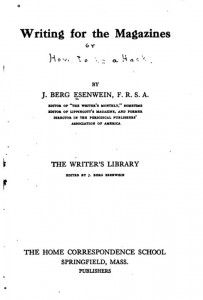Follow Scott
Recent Tweets
- Waiting for Twitter... Once Twitter is ready they will display my Tweets again.
Latest Photos
Search
Tags
anniversary Balticon birthdays Bryan Voltaggio Capclave comics Cons context-free comic book panel conventions DC Comics dreams Eating the Fantastic food garden horror Irene Vartanoff Len Wein Man v. Food Marie Severin Marvel Comics My Father my writing Nebula Awards Next restaurant obituaries old magazines Paris Review Readercon rejection slips San Diego Comic-Con Scarecrow science fiction Science Fiction Age Sharon Moody Stan Lee Stoker Awards StokerCon Superman ukulele Video Why Not Say What Happened Worldcon World Fantasy Convention World Horror Convention zombies
©2025 Scott Edelman
Writing advice from 1916—Part III
Posted by: Scott
Tags:
old books, old magazines
Posted date:
June 25, 2008 |
No comment
Dr. J. Berg Esenwein, in Writing for the Magazines, his 1916 manual for writers, gives us a peek into the minds of editorial assistants from 92 years ago. And aside from the fact that gender seems frozen and does not allow for the possibility of female editors, not much has changed.
Here’s how that assistant editor would have been looking at your manuscript:
The Assistant Manuscript Reader does the work indicated by his title. On large magazines there are more than one to do this exacting work. After each newly received manuscript is recorded—usually the date, title, name and address of the author, and the amount of postage enclosed are set down and a number is put on the envelope to show the reader in what order to take up the manuscripts. Sometimes a minor clerk attends to these matters of record.
As the reader goes over the manuscript of a poem, story or article, he has in mind, at least subconsciously, a number of questions by which each manuscript is brought to the test, for if the offering should fail in one or two vital points it is usually enough to concern it; and of course the one ever-present standard is: Does this meet our present needs?
Questions like these are in the editorial mind: Is this manuscript illiterate? Is it quite out of tune with our magazine? Is it dull? Is it trite? Is it behind the times? Is it poorly written? Does it fail to do what it sets out to? Have we already published, or have we on hand, enough or too much of a similar sort? Is it quite too long? How does it compare with a similar manuscript we are now considering? Is it good enough to warrant further consideration? Is the author promising enough to warrant our watching him, writing to him, asking for other material?
These and other questions, fitting the peculiar needs of each magazine, are part of the mental make-up of every alert manuscript editor, and in many instances it does not take long to determine either that a contribution is hopeless or that it should have further consideration.
As we all know, not all hopeless manuscripts are sent back forthwith, for now and then the work of the writer is good enough to warrant a letter from the editorial department; and of course there are many instances of manuscripts being held for further weighing and yet being found unavailable at last.
The managing editor, and the literary editor with his assistant readers, must more than any other members of the staff possess one quality—ability to look at all questions from a double view-point: their own and that of their chief. “All in all, I think he would like this,” is a constant judgment that assistants are forming; less frequently one will decide: “The chief doesn’t like this sort of stuff, but other magazines are using it successfully, it’s in the air nowadays, it’s well done, so I’ll put it up to him with a strong recommendation.”
Reading the question “Does this meet our present needs?” above makes me wonder when the phrase “does not meet our current needs” was first used in rejecting a manuscript.
Probably in the very first rejection letter sent in response to the very first unsolicited manuscript submitted to the very first magazine …

